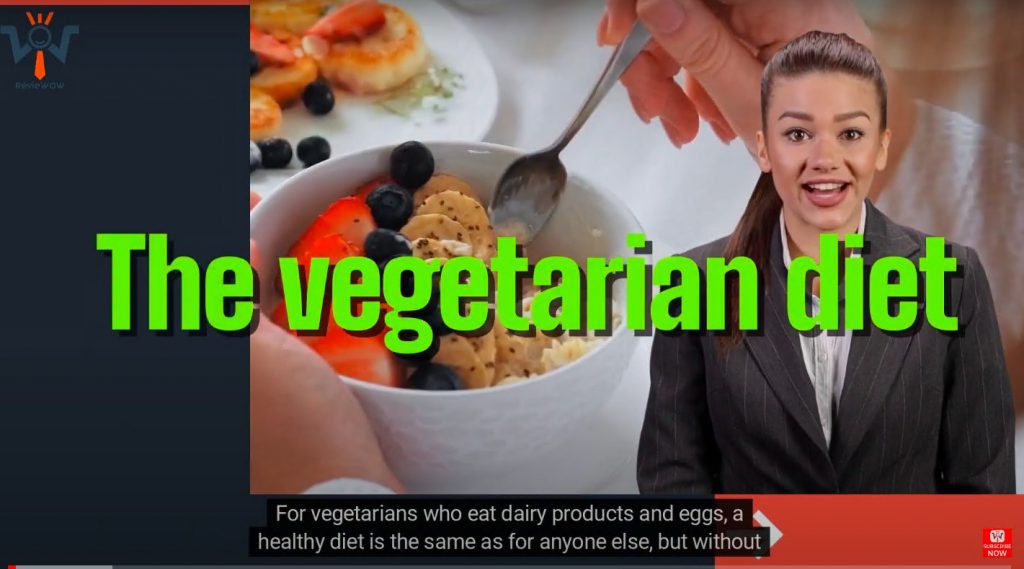A healthy diet for vegetarians who eat dairy products and eggs is the same as for everyone else, but without meat or fish.
The Eatwell Guide explains which foods to eat in what proportions to maintain a healthy, balanced diet.
You don’t have to achieve this balance with every meal, but try to achieve it over the course of a day, or even a week. When possible, choose low-fat, low-salt, and low-sugar options.
Content Table
Estimated reading time: 4 minutes
The Vegetarian Diet :
You should eat a variety of fruits and vegetables every day, according to the Eatwell Guide.
Aim for 5 80g portions of fresh, frozen, canned, dried, or juiced fruit and vegetables per day. Fruit and vegetables, in addition to vitamins and minerals, contain fibre, which can aid digestion and prevent constipation.
Potatoes, bread, cereals, rice, and pasta should account for slightly more than one-third of your daily calories. Choose wholegrain varieties whenever possible.
As part of a healthy, balanced diet, you should consume some starchy foods every day.
Starchy foods provide us with energy and are the primary source of a variety of nutrients in our diet. They contain fibre, calcium, iron, and B vitamins in addition to starch.
Milk and dairy products like cheese and yoghurt are high in protein, calcium, and vitamins A and B12.
Milk and dairy alternatives, such as calcium-fortified unsweetened soya, rice, and oat drinks, are included in this food group. Green, leafy vegetables, calcium-set tofu, and bread are also good sources of calcium.
Choose low-fat milk and dairy products to make healthier choices. Choose low-sugar options as well.
Consume beans, pulses, eggs, and other protein-rich foods.
Beans, peas, and lentils are examples of pulses. They’re a low-fat source of protein, fiber, vitamins, and minerals, and they count as a vegetable serving. Nuts and seeds are high in protein and other nutrients.
Pulses are especially important for people who do not get enough protein from meat, fish, or dairy products.
Eggs and meat substitutes such as tofu, mycoprotein, and textured vegetable protein are also nondairy protein sources.
tempeh and protein
To get the right mixture of amino acids, which are used to build and repair the body’s cells, you need to eat a variety of different protein sources.
Unsaturated oils and spreads should be used.
Unsaturated fats, such as vegetable, rapeseed, olive, and sunflower oils, are better for you than saturated fats like butter, lard, and ghee. However, all types of fat are high in energy and should be consumed in moderation.
Reduce your intake of foods high in fat, salt, and sugar.
Cream, chocolate, crisps, biscuits, pastries, ice cream, cakes, and puddings are high in salt, fat, and sugar and should be consumed in moderation. Foods in this category primarily provide energy in the form of fats and sugars, with only a trace of other nutrients.
It’s critical to eat a variety of foods. Some nutrients are found in lower concentrations or are less easily absorbed by the body in vegetarian sources than in meat or fish.
Most vegetarians get enough protein and calcium from their diet.
However, if you do not properly plan your diet, you may miss out on essential nutrients. Vegetarians, for example, must ensure that they consume enough iron and vitamin B12.
Vegetarians must ensure that they get enough vitamins and minerals during pregnancy and breastfeeding to ensure their child’s healthy development.
If you are raising your baby or child on a vegetarian diet, you must ensure that they consume a diverse range of foods in order to provide the energy and vitamins they require for growth.
Vegetarians are more likely than meat eaters to have low iron stores.
Vegetarians can get iron from the following foods:
kidney beans, chickpeas, and lentils are examples of pulses.
Apricots and other dried fruits
Watercress, broccoli, and spring greens are examples of dark green vegetables.
cereals fortified with flour and wholemeal bread (with added iron)
nuts
Vitamin B12 vegetarian sources
Vitamin B12 is required for normal growth, repair, and health.
It can only be found in animal products.
What are some vegetarian omega-3 fatty acid sources?
When consumed as part of a healthy diet, omega-3 fatty acids, particularly those found in oily fish, can help maintain a healthy heart and reduce the risk of heart disease.
Vegetarians can get omega-3 fatty acids from the following sources:
linseed oil
rapeseed oil walnuts omega-3-enriched egg
Evidence suggests that vegetarian sources of omega-3 fatty acids may not provide the same protection against heart disease as those found in oily fish.
However, if you follow a vegetarian diet, you can still protect your heart by eating at least 5 portions of a variety of fruits and vegetables each day, consuming less saturated fat, and monitoring your salt intake.
The Review
The Vegetarian Diet : A Beginner's Guide
👇👇👇 Click on the link below to enter the link mentioned in the video 👇👇👇
The Vegetarian Diet : A Beginner's Guide DEALS
We collect information from many stores for best price available

